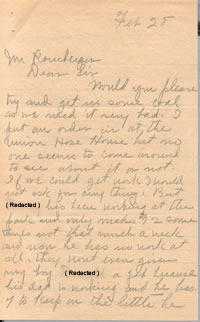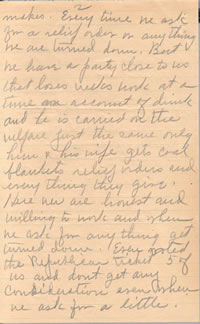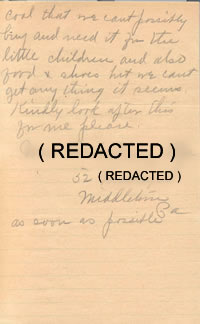The Great Depression - 1934
Images
Click images for larger versions.
History
Record Group 47: Records of the County Governments, Dauphin County Board of Assistance Unemployment Relief Records, 1931-1937. Letter to Russell Romberger, of the Office of the Director of the Poor, February 28, probably 1934 from the wife of a Middletown resident on relief. Two pages, pencil on ruled paper, 10 1/2" X 6 1/2".
During the past several centuries, nations with capitalistic economies periodically have experienced recessions and depressions. In American history, many have followed periods of warfare. In the 1760s, when the British withdrew their infusions of cash to the colonists for food and supplies for the conflict with the French and Indians, the economy declined. After the War for American Independence ended in 1783, and the British began to "dump" on the American market at low prices goods they had stored during the Revolution, there was a recession. The Panic of 1819 followed the War of 1812, and the Panic of 1873 occurred after the Civil War (1861-1865). Following World War I, there was a down-turn as the nation adjusted from war-time to peace-time production.
The most serious economic crisis in the nation's history was the "Great Depression" which occurred during the 1930s. It was more pervasive than other economic depressions because it was also an international tragedy. Its causes are complex. Europe's economy was affected adversely by the demand of the Allies, Great Britain and France, for monetary reparations from Germany as payment for damage that it inflicted during the Great War (1914-1918) at least some of which the German government paid with loans from the United States. Money was revolving in an unproductive circle. In the United States, consumers were purchasing many products on credit and saving little money, with the eventual result that manufacturers produced more goods than they could sell. Americans bought stocks in the same way--"on margin," paying down only a fraction of the price, expecting to pay the remainder from the seemingly inevitable profits when they sold them. Much of this financial activity came to a screeching halt in the fall of 1929 when the bottom fell out from under prices on the New York Stock Exchange. Investors, perhaps more accurately called speculators, unloaded 13,000,000 shares on "Black Tuesday," October 24, 1929. A few days later on "Tragic Tuesday," October 29, nearly 16,500,000 shares of stock were sold. Approximately 880 issues lost between $8,000,000,000 and $9,000,000,000. By November 13, the drastic drop in prices had cost stock holders $30,000,000,000. Many were left not only with nearly worthless stocks but also with the debts that they incurred to buy them. The "Stock Market Crash" symbolizes the beginning of the "Great Depression."
Although many Americans had prospered during the 1920s, some Pennsylvanians did not. Three major segments of Pennsylvania's economy already were depressed. Farmers were afflicted with low prices. The national government's high tariffs contributed to the Europeans' inability to sell their manufactured products in the United States making it difficult for them to buy American agricultural produce. The lack of foreign competition for the farmers' crops left agriculturalists with only the domestic market, depressing the prices that they could demand. Coal miners were experiencing unsteady employment.
United Mine Workers president John L. Lewis called miners out on strike in 1923 and 1925. With the supply of coal allegedly undependable, some consumers took advantage of technological developments and switched to oil and natural gas as home-heating fuels. Textile workers also were losing their jobs as mill owners shifted their operations to the South to take advantage of lower labor costs and other financial advantages. Problems such as these, in combination with those that were developing elsewhere in the nation as a whole and in Europe sent the state's economy into a deep depression, which became increasingly serious in the early 1930s.
The "Great Depression" had a disastrous effect on many working class Pennsylvanians, as the letter to the Dauphin County Board of Assistance reveals so poignantly. When manufacturers and mine operators realized that they had over-produced, they laid off employees. In 1932, 23.5% of Philadelphia's work force was unemployed, six times the average rate. By 1933, 40% of the state's work force was out of work. The situation was especially serious for the Pittsburgh area's African American steelworkers who had been hired most recently and were the first fired. People without incomes could not pay rents, mortgages, and taxes on their homes causing landlords, bankers, and sheriffs to evict the occupants. Pittsburgh's slums became worse as families who had been forced from their homes moved in with relatives and friends. Some Pittsburghers simply "squatted" in houses, apartments, or vacant areas that they did not rent or own. In Philadelphia in 1932, 19,000 homes were sold at sheriff's auctions. Some Pennsylvanians could not buy sufficient food. In 1933, 71,000 Philadelphians were reported to be suffering from malnutrition. The state's antiquated "poor boards" could not provide sufficient assistance. In Media, in 1933, one superintendent and one assistant had a case load of 800 families. If families such as those in the Middletown letter presented here already had the head of the household on relief, grown sons also out of work living with parents could not qualify for the same support.
Not only were working class people affected but also professionals and businessmen. Physicians and attorneys found it difficult to collect fees. Clergymen's and teachers' salaries were reduced. School administrators who had married couples on their faculties often retained the husbands and dismissed the wives in order to conserve funds and spread salaries among families. In 1935, members of the state legislature even reduced their annual remuneration from $3,000 to $2,500. Many people who had attempted to save perhaps for "rainy days," such as these, lost their accounts as 130 banks had failed by 1931. Some bankers and stock brokers lost not only all of their own money but that of their clients as well and were broken by the experience, not only financially but also emotionally. State sponsored programs during the administrations of Governors Gifford Pinchot (1931-1935) and George H. Earle (1935-1939) and those of the national government's "New Deal" of President Franklin D. Roosevelt (1933-1945) alleviated the suffering somewhat. They provided direct relief payments to those in poverty and could not work and jobs to the unemployed who could. Also important was the confidence in government and the hope for better times that these programs provided to people who could have applied more drastic solutions to their problems, as did the citizens of Italy and Germany. Ultimately, however, it was the need for Pennsylvania's products during World War II that restored full employment in the state.
Transcript
Feb. 28
Mr. Romberger
Dear Sir
Would you please try and get us some coal as we need it very bad. I put an order in at the Union Hose House but no one seems to come around to see about it or not. If we could get work I would not ask for any thing. But _____ has been working at the park and only makes $12 some times not that much a week and now he has no work at all. They wont even given my boy _______ a job because his dad is working and he has it to keep on the little he makes. Every time we ask for a relief order or any thing we are turned down. But we have a party close to us that loses weeks work at a time account of drink and he is carried on the welfare just the same only him and his wife gets coal blankets relief orders and every thing they give. Here we are honest and willing to work and when we ask for any thing get turned down. Even voted the Republican ticket 5 of us and dont get any consideration even when we ask for a little coal that we cant possibly buy and need it for the little children and also food and shoes but we cant get any thing it seems. Kindly look after this for me please.
Mrs _________________
__ Nissley St
Middletown Pa
as soon as possible


